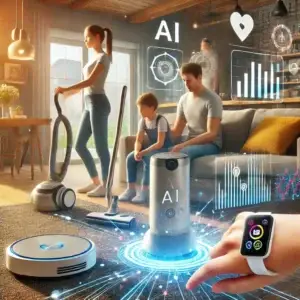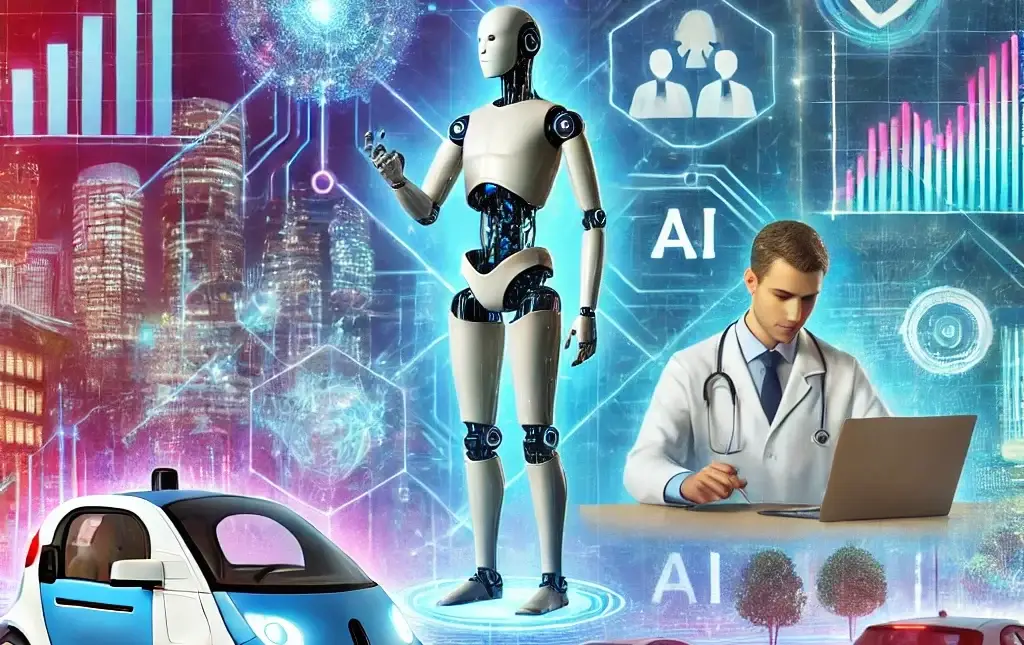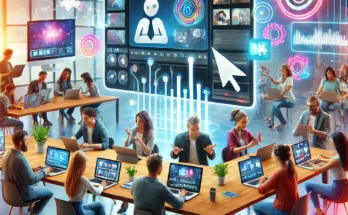The Uses of AI:
Transforming the World Around Us
Artificial Intelligence (AI) is no longer a futuristic concept confined to science fiction. Today, AI is everywhere—enhancing how we live, work, and interact. From automating mundane tasks to driving innovation, Ai

applications are as vast as they are transformative. In this blog, we’ll explore the many uses of AI and how it is revolutionizing industries and everyday life.
1. AI in Healthcare
AI is significantly improving healthcare outcomes. Its applications include:
- Early Diagnosis: AI-powered algorithms analyze medical data to detect diseases like cancer, diabetes, and heart conditions earlier than traditional methods.
- Personalized Medicine: By evaluating genetic information and patient history, AI suggests tailored treatment plans for individuals.
- Robotic Surgery: AI-assisted robots perform precise surgical procedures, reducing complications and recovery time.
- Drug Discovery: Machine learning accelerates drug research, reducing the time it takes to develop and test new treatments.
For example, AI-powered platforms like IBM Watson Health analyze massive datasets to provide actionable insights for medical professionals.
2. AI in Business and Finance
Businesses are leveraging AI to enhance operations, customer experience, and decision-making:
- Customer Support: Chatbots like ChatGPT offer instant assistance, reducing the need for human customer service representatives.
- Fraud Detection: Financial institutions use AI to identify suspicious transactions and prevent fraud.
- Market Analysis: AI tools analyze market trends and consumer behavior to help companies make data-driven decisions.
- Process Automation: From managing supply chains to HR functions, AI streamlines workflows and boosts efficiency.
AI is a game-changer for businesses, helping them reduce costs and increase productivity.
3. AI in Education
Education has embraced AI to make learning more accessible and personalized:
- Adaptive Learning Systems: Platforms like Duolingo use AI to adjust the difficulty of lessons based on individual progress.
- Automated Grading: AI tools evaluate assignments, saving teachers hours of work.
- Virtual Tutors: AI-powered tutors provide round-the-clock assistance to students.
- Access to Resources: AI translates and curates educational materials for students worldwide.
These innovations ensure that education is inclusive and tailored to the needs of each learner
4. AI in Transportation
- Traffic Management: AI monitors traffic flow in real-time, adjusting signals to reduce congestion and improve travel times.
- Predictive Maintenance: AI detects potential mechanical issues in vehicles and infrastructure, preventing costly breakdowns and improving safety.
- Navigation Systems: Tools like Google Maps use AI to provide accurate routes, estimate travel times, and recommend alternate paths during heavy traffic.
These advancements make transportation more efficient and contribute to reducing environmental impact by optimizing energy use.
5. AI in Entertainment
The entertainment industry has embraced AI to enhance content creation and user engagement:
- Personalized Recommendations: Streaming platforms like Netflix and Spotify use AI to suggest movies, shows, and music based on user preferences.
- Content Creation: AI generates realistic animations, visual effects, and even scripts, assisting creators in producing high-quality content.
- Gaming: AI-powered characters and environments make video games more immersive and challenging.
- Audience Analytics: AI tracks viewer behavior to help creators produce content that resonates with their target audience.
AI redefines how we consume and create entertainment, offering experiences tailored to individual tastes.
6. AI in E-commerce
E-commerce platforms utilize AI to enhance the shopping experience:
- Personalized Shopping: AI-driven recommendation engines suggest products based on browsing history and purchase patterns.
- Chatbots for Customer Support: AI chatbots assist shoppers with inquiries, helping them find products and resolve issues quickly.
- Inventory Management: AI predicts demand, optimizing stock levels to prevent overstocking or shortages.
- Visual Search: AI-powered tools let users search for items using images, making the shopping process more intuitive.
These innovations improve customer satisfaction while driving sales for businesses.
7. AI in Agriculture
AI is making farming smarter and more sustainable:
- Precision Agriculture: AI tools analyze soil, weather, and crop data to optimize planting and irrigation schedules.
- Pest Detection: AI-powered cameras identify pests early, reducing crop damage.
- Yield Prediction: Farmers use AI to predict harvest yields and plan logistics effectively.
- Automated Machinery: AI-driven tractors and harvesters improve efficiency and reduce manual labor.
These technologies help farmers increase productivity while conserving resources.
8. AI in Security
AI enhances safety and security across various domains:
- Cybersecurity: AI detects and responds to cyber threats in real time, safeguarding sensitive data.
- Surveillance: AI-powered cameras recognize faces and detect unusual behavior, improving public safety.
- Fraud Prevention: Financial institutions use AI to spot fraudulent activities, ensuring secure transactions.
- Disaster Response: AI analyzes data to predict natural disasters and aid emergency response efforts.
By identifying risks and providing rapid solutions, AI plays a critical role in protecting people and assets.
9. AI in Environmental Sustainability
AI contributes to environmental conservation and sustainability efforts:
- Climate Modeling: AI predicts weather patterns and assesses the impact of climate change.
- Energy Optimization: Smart grids use AI to distribute electricity efficiently, reducing waste.
- Wildlife Monitoring: AI-powered drones and sensors track animal populations and combat poaching.
- Waste Management: AI systems sort recyclable materials, improving waste disposal processes.
These applications help mitigate environmental challenges and promote a sustainable future.
10. AI in Everyday Life
- Smart Assistants: Tools like Alexa, Siri, and Google Assistant help manage schedules, answer queries, and control smart home devices.
- Health and Fitness: Wearable devices powered by AI monitor fitness metrics, provide exercise suggestions, and track health conditions.
- Smart Appliances: AI-enabled appliances like robotic vacuum cleaners and smart thermostats make home management effortless.
- Language Translation: AI tools like Google Translate break language barriers, fostering global communication.
Conclusion
Artificial Intelligence is reshaping every aspect of our lives, from healthcare and education to transportation and entertainment. Ai uses are expanding, providing solutions to challenging issues and improving our daily experiences.nt pose challenges, the benefits of AI significantly outweigh its drawbacks when utilized responsibly.. As AI evolves, it promises to unlock even greater potential in the years to come.
FAQs
1. How does AI impact job markets?**
AI automates repetitive tasks, which can lead to the displacement of certain jobs. However, it also opens up new opportunities in the fields of AI development, maintenance, and ethical governance.
2. Can AI replace human creativity?**
While AI can assist with creative tasks, it lacks the emotional depth and originality of human creativity.
3. Is AI safe for use in healthcare?**
Yes, when used responsibly, AI can enhance diagnostic accuracy and treatment efficiency.
4. How does AI help fight climate change?
AI predicts climate patterns, optimizes energy use, and aids in wildlife conservation, contributing to sustainability efforts.
5. What are the ethical concerns surrounding AI?
Ethical concerns include data privacy, algorithmic bias, and the misuse of AI technologies, emphasizing the need for regulations and transparency.



